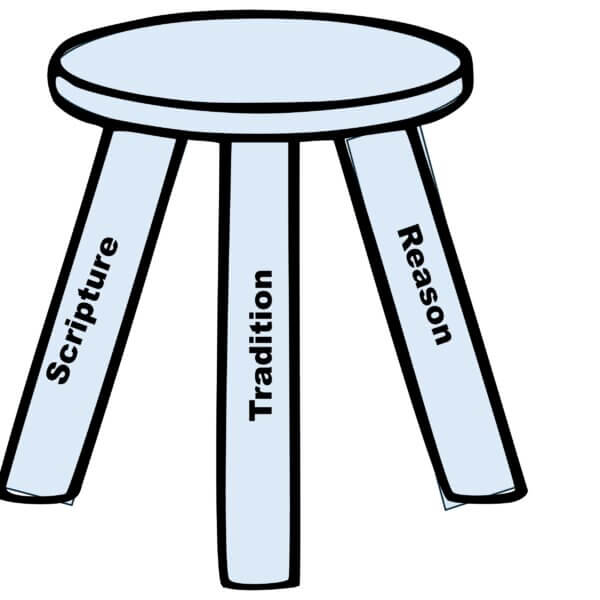
Teaching With Authority
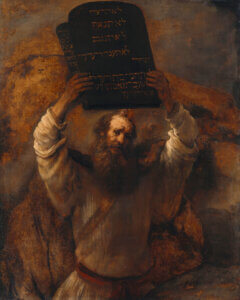 What is a prophet? Merriam-Webster tells us that a prophet is one who utters divinely inspired revelations. A more common understanding is that a prophet is an inspired teacher or someone who proclaims the will of God. But prophets can be a royal pain. They have an uncanny knack for pointing out things you don’t want to see and telling you things that you don’t want to hear. When a prophet shows up and starts to prophesy, it’s not usually to say “You all are doing great! Keep up the good work!” Instead, they’ve come to tell us what Al Gore would call an inconvenient truth, asking us to see things in a new way — to understand what we thought we knew from a different perspective. Even though prophets are set apart in community — either as leaders or folks we’d rather not listen to, a real prophet knows us — our context. That’s part of what makes them uncomfortable to be around.
What is a prophet? Merriam-Webster tells us that a prophet is one who utters divinely inspired revelations. A more common understanding is that a prophet is an inspired teacher or someone who proclaims the will of God. But prophets can be a royal pain. They have an uncanny knack for pointing out things you don’t want to see and telling you things that you don’t want to hear. When a prophet shows up and starts to prophesy, it’s not usually to say “You all are doing great! Keep up the good work!” Instead, they’ve come to tell us what Al Gore would call an inconvenient truth, asking us to see things in a new way — to understand what we thought we knew from a different perspective. Even though prophets are set apart in community — either as leaders or folks we’d rather not listen to, a real prophet knows us — our context. That’s part of what makes them uncomfortable to be around.
We read from Deuteronomy this morning about Moses, a prophet who knew the Israelites better than they knew themselves. God will raise up a prophet like me from among your own people, says Moses in today’s reading. As theology professor Brian Bantum writes, This prophet will not be a stranger with a new perspective or one with expertise that does not already reside within the community. “Your own people” suggests a more difficult prophet to hear—one who is familiar, who is known, who sees us in our daily lives and who is perhaps easy to ignore because we see her or him every day, too. Or at least we think we do. When that prophet speaks to us of idolatry, pointing out how our choices can effectively prioritize our own well-being over others’, we will be tempted to resist the message, because if we can’t, then too much has to change in our lives.
Challenging Times
We live in challenging times, and we’re confronted every day with different points of view, and with authority figures — political, academic, theological, economic, cultural, and civic — each with their own views about the “only way out” of the crisis at hand, each of which views routinely contradicts all the others. How do we determine who has authority? How can we detect a false prophet? It’s important to work hard at this, because the stakes are no less than ultimate: The Hamas-Israel war, and the war in Ukraine, and like them, wars all over the world with both local and global drivers and consequence. Choices in the coming election season. Our climate crisis. Affordable housing. Hunger. Education. Access to healthcare.
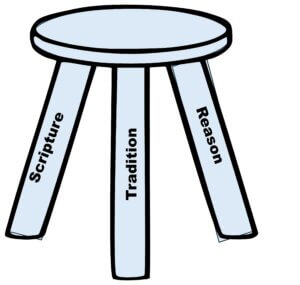 There are a lot of authority figures out there telling us what to do and what to think. How do we hear God’s voice through all of the din? How do we identify a prophet? I don’t know, but I think we’ve all come to the right place to talk about it. Church, and faith, can’t tell us what to think — at least in our Episcopal faith tradition built on the three-legged stool of scripture, tradition, and reason. But that foundation of scripture, tradition, and reason can guide how we listen and pray. As Anglicans (called Episcopalians in the United States, because we are guided by bishops, or episkopus, meaning overseer), we marshal our precedent (that’s scripture), our tradition (the harbor buoys that guide us in identifying prophets and discerning authority), and our senses — our reason — to do what is of God. That means remembering the examples in scripture, like what God tells Moses in today’s reading: Anyone who does not heed the words that a prophet speaks in my name, I myself will hold accountable. But any prophet who speaks in the name of other gods, or who presumes to speak in my name a word that I have not commanded the prophet to speak—that prophet shall die.
There are a lot of authority figures out there telling us what to do and what to think. How do we hear God’s voice through all of the din? How do we identify a prophet? I don’t know, but I think we’ve all come to the right place to talk about it. Church, and faith, can’t tell us what to think — at least in our Episcopal faith tradition built on the three-legged stool of scripture, tradition, and reason. But that foundation of scripture, tradition, and reason can guide how we listen and pray. As Anglicans (called Episcopalians in the United States, because we are guided by bishops, or episkopus, meaning overseer), we marshal our precedent (that’s scripture), our tradition (the harbor buoys that guide us in identifying prophets and discerning authority), and our senses — our reason — to do what is of God. That means remembering the examples in scripture, like what God tells Moses in today’s reading: Anyone who does not heed the words that a prophet speaks in my name, I myself will hold accountable. But any prophet who speaks in the name of other gods, or who presumes to speak in my name a word that I have not commanded the prophet to speak—that prophet shall die.
Well that’s clear. Now — we don’t wish any actual harm to the authority figures out there deliberately trying to confuse us in order to advance their own agendas, because even false prophets are human beings, bless their spiky little hearts. But it would be nice if God’s promise to Moses to strike down a false prophet were that visible and clear. It would make our whole faith job as Episcopalians, sitting with hope and courage on our three-legged stool of scripture, tradition, and reason — easier and clearer. What we do know is that everyone who is sincerely trying to discern what’s right, and what God wants for us, ultimately stops listening to authority figures who are advancing their own agendas, so a false prophet’s message and moral authority dies.
If It’s Not of Love, It’s Not of God
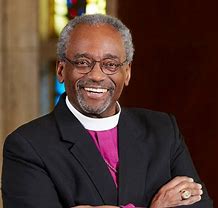 Here’s another tell: As Michael Curry, our Presiding Bishop, often says, if it’s not of love, it’s not of God. If the testimony you’re hearing or reading — on the news, at a political rally, in conversation — is not based in love and in respect for the dignity of every human being, as our baptismal covenant recites, it’s not what God wants for us. Our task as believers is to have courage, a form of faith that St. Paul talks about a lot. And faith is not what the Red Queen tells Alice in Through the Looking Glass — that is, believing six impossible things before breakfast. Faith is the courage and strength to hold fast to what’s right even in the face of persistent opposition and even over and against attempts to confuse us with agendas that advance some at the expense of others.
Here’s another tell: As Michael Curry, our Presiding Bishop, often says, if it’s not of love, it’s not of God. If the testimony you’re hearing or reading — on the news, at a political rally, in conversation — is not based in love and in respect for the dignity of every human being, as our baptismal covenant recites, it’s not what God wants for us. Our task as believers is to have courage, a form of faith that St. Paul talks about a lot. And faith is not what the Red Queen tells Alice in Through the Looking Glass — that is, believing six impossible things before breakfast. Faith is the courage and strength to hold fast to what’s right even in the face of persistent opposition and even over and against attempts to confuse us with agendas that advance some at the expense of others.
Our English word belief can confuse us sometimes too — and get us thinking that somehow faith is tied up with our intellectual assent to a series of dodgy propositions, as my dear friend and former All Saints’ Atlanta rector, Geoffrey Hoare, often says in his inimitable British way. Any of you who have ever said or sung the Latin Mass — said if your roots are Roman Catholic, or sung, if you’ve ever been in any choir anywhere — know the first word of the Nicene Creed: Credo. Literally I believe. How does the word credo come into English? You can hear it — credit. When you have credit, you have trust. Trust is not about fact, it’s about hope and a passion for truth. And truth is not about historicity, or the “actual factual” nature of the physical world, but instead is about the physical world’s, and all of its creatures’, interdependence in the deep, essential goodness of God. And that’s the authority we’re looking for in a prophet.
Jesus Taught With Authority
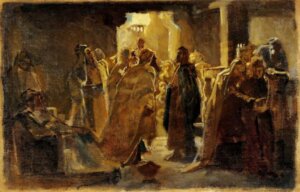 Our reading from the gospel of Mark today places us in a synagogue in Capernaum, close to Jesus’ hometown in Nazareth, inland by about a half-day’s walk, and up through the Arbel pass in the mountains as they rise toward the Golan Heights. Jesus spent most of his earthly ministry in the villages around the Sea, and in the hill country of the Lower Galilee nearby. He was among his people there — Galileans — and they knew him. When the Sabbath came, he entered the synagogue and taught. And people were astounded by his teaching, because he taught with authority, and not like the scribes. Even an unclean spirit recognizes Jesus’ authority and can tell he’s God’s prophet! A demon would not have been likely to agree with Jesus’ teaching, just because he was a neighbor.
Our reading from the gospel of Mark today places us in a synagogue in Capernaum, close to Jesus’ hometown in Nazareth, inland by about a half-day’s walk, and up through the Arbel pass in the mountains as they rise toward the Golan Heights. Jesus spent most of his earthly ministry in the villages around the Sea, and in the hill country of the Lower Galilee nearby. He was among his people there — Galileans — and they knew him. When the Sabbath came, he entered the synagogue and taught. And people were astounded by his teaching, because he taught with authority, and not like the scribes. Even an unclean spirit recognizes Jesus’ authority and can tell he’s God’s prophet! A demon would not have been likely to agree with Jesus’ teaching, just because he was a neighbor.
What is authority? It’s the same question we consider in identifying a prophet, and just as in the Prophet Identification Process, absolutely everything is at stake. We need to be able to spot authority to support our faithful evaluation of truth, and the needed actions that flow from truth, using our three-legged stool of scripture, tradition, and reason. Merriam-Webster points to leadership: the power to influence or command thought, opinion, or behavior. Authority is also convincing. The idea stands on its own as believable. Authority is a foundation, or the convincing basis for the belief or understanding that something is true. And authority is expertise, the knowledge or experience that makes one’s advice worthy, or one’s teaching credible — not like the advice of those who might not fully understand the question, or are pushing their own personal agenda.
People recognized that Jesus taught with authority, not like other teachers in the synagogue who taught from tradition only, weren’t all that believable, and didn’t seem to be right about things. This is our clue to see Jesus is a prophet, one who speaks God’s word. Through the context of small, intimate, first century Capernaum, we know that Jesus’ authority wasn’t signaled with hundreds of flags with his name on them, or broadcast over a loudspeaker, on a Jumbotron, or followed by millions on social media. It was just Jesus and the people, and yet, they were astounded by his leadership, power, and credibility even before the demon recognized him. That last part of the story is just a flourish. Jesus’ teaching felt immediately true and believable.
Let us sit on our three-legged stools of scripture, tradition, and reason as we listen for the authority of prophets in the world today. It matters not less than completely, and the stakes are ultimate. Amen
